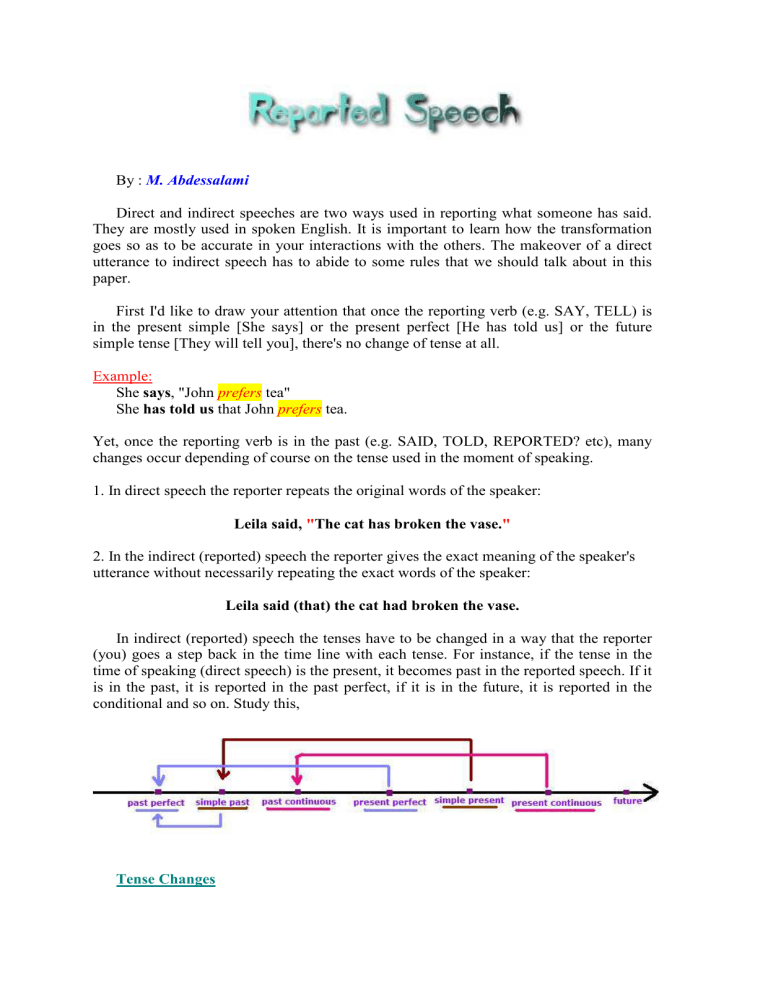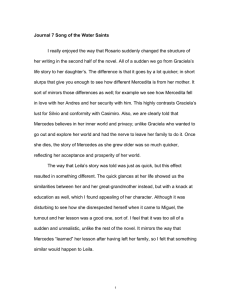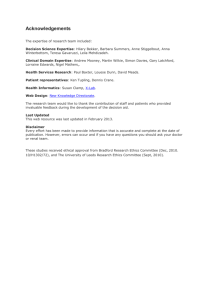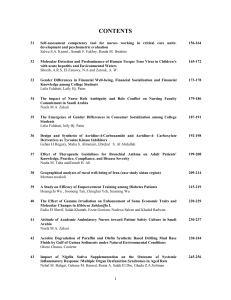
By : M. Abdessalami Direct and indirect speeches are two ways used in reporting what someone has said. They are mostly used in spoken English. It is important to learn how the transformation goes so as to be accurate in your interactions with the others. The makeover of a direct utterance to indirect speech has to abide to some rules that we should talk about in this paper. First I'd like to draw your attention that once the reporting verb (e.g. SAY, TELL) is in the present simple [She says] or the present perfect [He has told us] or the future simple tense [They will tell you], there's no change of tense at all. Example: She says, "John prefers tea" She has told us that John prefers tea. Yet, once the reporting verb is in the past (e.g. SAID, TOLD, REPORTED? etc), many changes occur depending of course on the tense used in the moment of speaking. 1. In direct speech the reporter repeats the original words of the speaker: Leila said, "The cat has broken the vase." 2. In the indirect (reported) speech the reporter gives the exact meaning of the speaker's utterance without necessarily repeating the exact words of the speaker: Leila said (that) the cat had broken the vase. In indirect (reported) speech the tenses have to be changed in a way that the reporter (you) goes a step back in the time line with each tense. For instance, if the tense in the time of speaking (direct speech) is the present, it becomes past in the reported speech. If it is in the past, it is reported in the past perfect, if it is in the future, it is reported in the conditional and so on. Study this, Tense Changes Reported Speech Direct Speech Indirect Speech do /does did am / is / are doing was / were doing have / has done had done did had done shall do should do will do would do can do could do must do had to do needn't do didn't have to do should do should have done * would do would have done * could do could have done * N.B.: These tense changes are automatic only after past tense reporting verbs (said, told, informed, explained, etc). Remark Most Grammar books prefer not to change "would", "could", "should" & "might". - He said, "I could solve the problem" He said that he could have solved the problem" * With the use of "could have solved the problem" we surely create some misunderstanding. Look at this example for better understanding. - He said, "I would help him if I could" He said that he would help him if he could. Here it would be quite incomprehensible if we changed the modal verbs. We NORMALLY keep them as they are for fear the sentence in the reported speech should create confusion. That's why some grammarians avoid changing "could do", for instance, into "could have done". NOW have a look at this sentence and try to put it into the reported speech - He said, "If I had a lot of money, I would buy the most expensive car ever" - He said (that) _______________________________________________ Pay attention because you are going to report this as well: - He said, "I had breakfast late this morning" - He said (that)________________________________________________ KEY BELOW 2 M. Abdessalami Reported Speech Some other expressions (signifiers) such as the adverbs of time and place also change Direct Speech Indirect Speech here there now / at the moment then / at once this that yesterday the day before (or) the previous day the day before yesterday two days before last week/month/year/Monday etc. the previous week/month/year/Monday etc. tomorrow the day after (or) the following day the day after tomorrow in two days time next week/month/year/February/Sunday etc. The following week / month / year / February / Sunday etc. three years ago three years before today / tonight that day / that night N.B.: These equivalents are not to be taken for rules. With Test Papers: During the exam, the students' main purpose is not the level of their fluency in English but the ability to get good grades. Therefore, they are mostly interested in how to get the correct answers. Their first concern is to get them the simplest and easiest way. So, here are some helpful tricks which, once grasped, pave the way for the students to achieve their goal. The tenses with auxiliaries (am/is/are/was/were/have/has/have been etc) in the direct speech are the easiest ones to report because the auxiliary is to be your key focus. You need only to deal with the auxiliary and forget about the main verb. That's why the "continuous" and "perfect" tenses are the easiest to do. Look at these examples: - John said, "I am going to look for a larger flat" - John said that he was going to look for a larger flat. - Sue said, "I have done my homework." - Sue said that she had done her homework. This is also true with modal verbs (will, can, must, may, etc). Our emphasis should go to them and keep the main verbs untouched. - John said, "The pupils may go home earlier this afternoon" - John said that the pupils might go home earlier that afternoon. - The teacher said, "The best students will be rewarded." - The teacher said that the best students would be rewarded. 3 M. Abdessalami Reported Speech Illustrations: _____________________________________________________________________ _____________________________________________________________________ The Present Tense The present tense becomes the past tense except for reporting a general truth. In this case the present tense doesn't change. EXAMPLE - She said, "The capital city of Morocco is Rabat" She said that the capital city of Morocco is Rabat. - The teacher said, "Elephants have good memory" The teacher said that Elephants have good memory. 4 M. Abdessalami Reported Speech Apart from reporting general truths, the rule is to be respected. The simple present tense First off, you have to learn your Irregular Verbs. If you don't learn them well, they can make a lot of mess in your paper no matter how well you grasp the rules. 1. Leila said, "I have a big car" => She said that she had a big car. 2. Leila said, "I always drive to school" => She said (that) she always drove to school. 3. Leila said, "I never go to work on foot" => She said (that) she never went to school on foot. The present progressive The focus here is primarily on the auxiliary as shown previously, whereas the main verb is retained. - Leila and Sue said, "We are making cakes" They said that they were making cakes. - Sue said, "Leila is washing some dishes in the kitchen" Sue said that Leila was washing some dishes in the kitchen" - Leila said, "Sue isn't feeling well" Leila said that Sue wasn't feeling well" The present perfect "HAVE" or "HAS" only bear the change. Both of them become "HAD". That's all. - Leila said, "Peter has sold his old car" Leila said that Peter had sold his old car. - Ali said, "We have made the biggest mistake" Ali said that they had made the biggest mistake. - Peter said, "Tania has never been to Marrakech" Peter said that Tania had never been to Marrakech. - John said, "I have not visited Marrakech yet" John said that he had not visited Marrakech yet. EXERCISE 1. Leila said: "I am going to Tangiers with Sue" Leila said that ____________________________________________ 2. The man said: "My name is Mr. X" The man said that ________________________________________ 5 M. Abdessalami Reported Speech 3. Vicky said, "They are learning new things about life" Vicky said that __________________________________________ 4. Leila said, "Sue is waiting outside" Leila said that ___________________________________________ 5. Leila said, "Peter has taken the wrong train" Leila said that ___________________________________________ 6. Peter said, "They are not giving any party today" Peter said that ____________________________________________ 7. They said, "We have seen this film twice" They said that ____________________________________________ (key below) The Past Tense The first thing you have to care too much about here is your IRREGULAR VERBS. If you don't know the past participle of a given verb everything will collapse and all the rules you master are useless. So be careful, it is a matter of Right or Wrong. Also you have to deal with the pronouns and the signifiers carefully. The Simple Past 1. Peter said, "I lost my keys in the train yesterday" Peter said that he had lost his keys in the train the day before. 2. Juliana said, "I was extremely nervous last week" Juliana said that she had been extremely nervous the previous week. 3. Hassan said, "We went to bed early last night" Hassan said that they had gone to bed early the night before. 4. Vicky said, "I didn't take a taxi home last night" Vicky said that She hadn't taken a taxi home the previous night. 5. Leila said, "I read this book a few years ago." Leila said that she had read that book a few years before. The Past Continuous "was" and "were" become "had been". 1. Peter said, "I was having a shower." Peter said that he had been having a shower. 2. The boy said, "We were at home playing chess." The boy said that they had been at home playing chess. 6 M. Abdessalami Reported Speech The Past Perfect No change except for the pronouns. 1. Peter said, "The children had worked hard." Peter said that The children had worked hard. 2. The boys said, "We had done our homework." The boys said that they had done their homework. Reporting Modals As it was mentioned above the modal "will" becomes "would". Pay attention to the pronouns and the adverbs of time and place (signifiers). - Leila said, "I will see you here tomorrow." Leila said that she would see me there the day after. - Hassan said, "I won't go to work by car tomorrow." Hassan said that he wouldn't go to work by car the following day. - Leila said, "The neighbours would complain!" Leila said that the neighbours would have complained. - Peter said, "I'll see what I can do for you!" Peter told me that he would see what he could do for me. - The teacher said, "Someone should clean the chalkboard" The teacher said that someone should have cleaned the chalkboard. - The teacher said, "You needn't bring your school bags tomorrow afternoon." The teacher said that we didn't have to bring our school bags the next afternoon. - John said, "I am sorry, but I couldn't help you!" John said he was sorry, but he couldn't have helped us. - Sue said, "Leila may have problems with her old car" Sue said that Leila might have problems with her old car. - Vicky said, "I must go home!" Vicky said that she had to go home. The Imperative What you have to retain about the use of the imperative in the direct speech is that it turns into the infinitive with "to" in the reported speech. If the speaker uses a negative imperative, the reporter should place "NOT" before the infinitive. The reporting verbs are generally, (ask, tell, order) 1. He said, "Speak up, please!" He asked me to speak up. 2. She shouted, "Don't touch anything!" She ordered me not to touch anything. 7 M. Abdessalami Reported Speech 3. Mother said, "Get your hair combed" Mother ordered me to get my hair combed. 4. Father said, "Don't be funny!" Father told me not to be funny. 5. The teacher said, "Do it again!" The teacher told us to do it again. Report Questions Before all, the reporting verbs used with questions are various, [asked, wanted to know, inquired, wondered, etc.]. There are normally two sorts of questions: I. Yes/No questions [Are you ready?] II. With question words [why do you look so tired?] I. When reporting a YES/NO question use " if " or " whether " appropriately. - Hassan, "Are you ready?" - Hassan asked me if I was ready. - Leila, "Do the boys do well at school?" - Leila asked the teacher whether the boys did well at school. II. When the question uses a question word, use it, too. - John, "Where were you last night?" John wanted to know where I had been the previous night. - Peter said, "Does she always have breakfast at home?" Peter wanted to know if she always had breakfast at home. - Sue said, "May I use your mobile phone?" Sue asked if she might use my mobile phone. Compound Sentences Reporting long speeches is not really an easy game; however it is not complicated. Once you learn how to manage simple sentences you can do the same for compound or complex utterances. 1. The clerk, "Take these papers to the manager and make sure she reads them before you leave her office." The clerk asked his assistant to take those/the papers to the manager and to make sure she read them before he left her office. 2. Peter said, "I wouldn't buy a luxurious car if I were as rich as you are, but I would rather buy a large house". 8 M. Abdessalami Reported Speech Peter told Sindy that he wouldn't have bought a luxurious car if he had been as rich as she is, but he would rather have bought a big house. Special Cases Sometimes the reporting becomes completely based on the introducing (reporting) verb. Here, the complication dwells in the fact that the content of the direct speech is either an advice, a confession, a comparison or else. 1. Sue said, "My scooter is like a jaguar!" Sue compared her scooter to a jaguar. 2. Leila said, "If I were you, I'd be patient." Leila advised me to be patient /_/_/_/_/_/_/_/_/_/_/_/_/_/_/_/_/_/_/_/ KEY - He said, "If I had a lot of money, I would buy the most expensive car ever" He said (that) if he had had a lot of money he would have bought the most expensive car ever - He said, "I had breakfast late this morning" - He said (that) he had had breakfast late that morning. _/\_/\_/\_/\_/\_/\_/\_/\_/\_/\_/\_/\_/\_/\_/\_/\_/\_/\_/\_/\_/\_/\_/\_/\_/\_/\_/\_/\_/\_/\_ 1. Leila said: "I am going to Tangiers with Sue" Leila said that she was going to Tangiers with Sue 2. The man said: "My name is Mr. X" The man said that his name is / was Mr X 3. Vicky said, "They are learning new things about life" Vicky said that they were learning new things about life. 4. Leila said, "Sue is waiting outside" Leila said that Sue was waiting outside 5. Leila said, "Peter has taken the wrong train" Leila said that Peter had taken the wrong train 6. Peter said, "They are not giving any party today" Peter said that they were not giving any party that day. 7. They said, "We have seen this film twice" They said that they had seen the / that film twice. ENJOY & GOOD LUCK 9 M. Abdessalami


